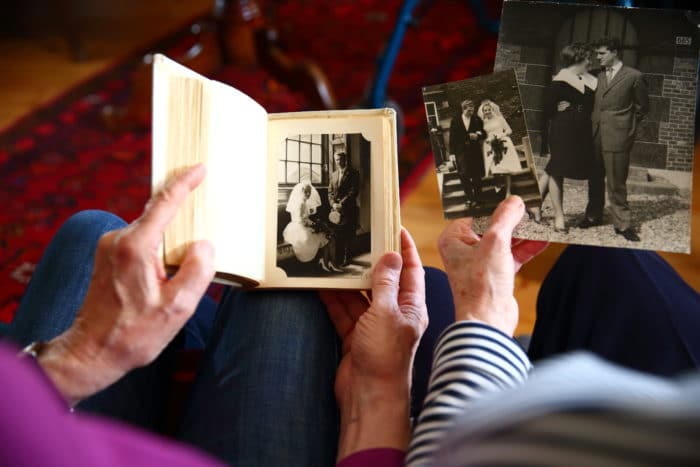
Being in the familiarity of your own home can alleviate a lot of the worry that follows a dementia diagnosis. And whilst it’s worth noting that the design and layout of your home can make an impact on an individual living at home with dementia, there are things that you can do to make life easier.
We’ve put together some minor changes that you can make to some of the main rooms in your home, giving you and your loved ones peace of mind that you’re safe and comfortable in your own space.
Kitchen
- Be mindful of clutter
Not only can clutter cause confusion to someone living with dementia, but it’s also a trip hazard and potentially a fire risk, too. - Keep crockery plain
Patterned plates and bowls can be a sensory overload to an individual with dementia. Try to use crockery that is one block colour and in contrast to the rest of the table. - Add labels to appliances
Not only does it enable your loved one to identify objects that are used often, but it also helps decipher any appliances that can reach extreme temperatures. - Keep common objects within easy reach
Try to keep objects that are used regularly in one place and within reach, such as teacups, spoons, sugar, teabags and the kettle.
Living room
- Use plain, contrasting furniture
Loud patterns on furniture can be confusing and disorientating for someone with dementia. Try to keep to plain, block-coloured furniture or use a plain coloured throw so that your loved one can see them more easily. - Try to keep decorative artwork to a minimum
Lots of decoration can be overwhelming and confusing, and paintings or other artwork could be misinterpreted as the condition progresses. - Remove trip hazards
Decorative items such as rugs, blankets, small tables and ornaments can put your loved one at risk of falling. Try to keep the floor as clear as possible so they can move about freely without obstruction. - Display photos of treasured memories and loved ones
Not only do photographs bring comfort and trigger memories, but they also regularly remind your loved one of those who are important to them.
Bedroom
- Install a night light
Your loved one might wake quite often feeling disorientated or need regular toilet breaks. Installing a night light will help them to find their bearings. - Use contrasting bed linen
This will make the bed easier for your loved one to see, so if they are feeling tired or disorientated they can easily navigate their way to a peaceful night’s rest. - Invest in some pressure sensors
Pressure sensors in or around the bed can detect when your loved one gets up, and can also send an alert to an emergency contact if they’ve been out of bed for a long time. - Keep a list of emergency contacts nearby
If your loved one wakes in the night feeling disorientated or distressed, a list of contacts gives them access to people they can call to help reassure them.
Bathroom
- Label the toilet door clearly
Struggling to locate the bathroom can cause lots of anxiety for a loved one living with dementia, so this will allow them to easily access the bathroom as and when they need it. - Consider changing the locks so they can be easily opened
Altering the locks to make them more accessible will allow you to open the door if your loved one has a fall or has difficulty with the lock. - Flood prevention plug
These are specially designed to allow water out of the bath or sink if the water becomes too full, reducing the risk of flooding in your loved one’s home. - Use non-slip mats to prevent falls
Non-slip mats on the floor or in the bath or shower will protect your loved one from the risk of an unpleasant fall.
Tips for caregivers
As a friend, carer or a family member of someone living with dementia, it’s completely natural for you to want to do everything you can to help. Making these changes around their home can be a great way to maintain their wellbeing at home, but it’s worth taking a few things into consideration when making these changes.
- Remember that it might not be necessary to make all these changes straight away. With the anxieties that come with dementia, familiarity is key; where you can, keep things as they are.
- It’s important to involve your loved one when you’re considering these changes. After all, they are the person that these changes will affect the most, and it’s important to know that they’re comfortable and understand what’s happening.
- And most importantly, don’t be afraid to ask for help. If you need support, information or advice on how you can do the best by your loved one, your local Helping Hands care team are here for you whenever you need. No matter the question, we’re here for you.
Page reviewed by Deanna Lane, Senior Clinical Lead on March 24, 2022
